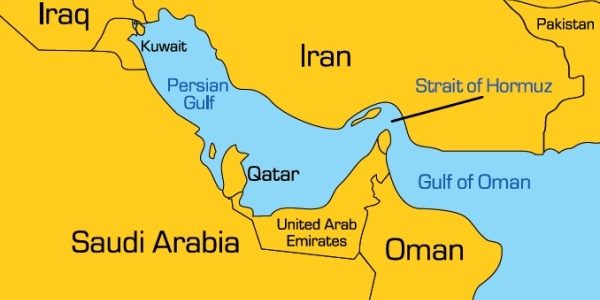
Iran has threatened to block access to the world’s busiest oil route in response to U.S. sanctions designed to reduce the revolutionary Shiite Muslim power’s petroleum exports to zero. While there has been no indication that Iran was prepared to go through with the warning, such a move would likely be catastrophic for the region and global energy prices.
The first batch of U.S. sanctions on Iran came into effect Monday, following President Donald Trump’s withdrawal in May from a 2015 landmark nuclear deal between the two countries, as well as five other major powers. These sanctions include restrictions on Iran’s manufacturing, aviation and automobile industries, but the next round on November 4 will specifically prohibit international companies from doing business with the country’s oil and gas sector.
Amid a political shouting match between the U.S. and Iranian governments, Iran’s elite and highly influential Revolutionary Guards reportedly staged a large-scale military exercise in the Strait of Hormuz, where nearly a third of the world’s oil supplies pass through. The hardliner force has championed Iranian President Hassan Rouhani since he appeared to threaten to close the oil chokepoint, an order that the Revolutionary Guards leadership said it would be eager to carry out.
Despite these high-running tensions, Texas-based think tank Geopolitical Futures’s Director of Analysis Jacob Shapiro told Newsweek it was “exceedingly doubtful” that Iran would ever actually risk shutting down the critical lifeline for global oil trade. In the event that it did, however, he said that “the consequences of taking this step would be dire.”
“If Iran decided it had nothing left to lose because U.S. sanctions are effectively killing Iranian oil exports and prioritized looking strong at home over all else, there would be a large, short-term spike in the price of oil. After all, about 30 percent of all seaborne-traded crude oil goes through the Strait of Hormuz,” Shapiro said.
“But the important thing to keep in mind here is it would be a temporary spike. Sooner or later (and probably sooner), the Strait of Hormuz would be reopened. U.S. shale producers would send production into overdrive. Russia would also look to increase production and replenish its much-depleted coffers. The most significant consequence of a Strait of Hormuz closure might ironically be a cash infusion for Russia’s struggling economy,” he added.
Shapiro argued that such a move would be unsustainable on Iran’s part as it would “result in a foreign intervention.” The U.S. military would likely get involved on behalf of Sunni Muslim monarchies such as Kuwait, Saudi Arabia, Qatar and the United Arab Emirates, and the Iranian military simply does not compare in terms of strength. Still, the recent Revolutionary Guards exercise in the Strait of Hormuz caught the attention of the Pentagon’s leadership.

